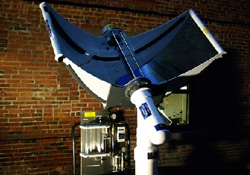Cheap, clean hydrogen is the holy grail in the green-technology world, and Nanoptek says it could have part of the answer.
The Maynard, Mass.-based company, which Wednesday announced that it has raised $4.7 million, has come up with a low-cost, durable titania electrode that can split water molecules into hydrogen and oxygen.
Sunlight hits the electrode, and the electrode splits the light into a positive charge (called a hole) and an electron. Before the two charges can rejoin, the electron gets captured by the electrode and then is exploited to split water. Silicon solar cells operate on the same principle.
Other companies have tried to use titania electrodes for this job in the past, but they broke down relatively rapidly, according to Nanoptek. The company's electrodes work better because, ironically, they are more brittle. The crystal lattice in the electrode is stressed, i.e. additional materials are added. (Semiconductor makers similarly stress their chips with germanium to create strained silicon, which improves performance.)
"This stretches the titania crystal lattice so that electrons (red areas in the image) are held less tightly in the lattice and so can be knocked out of the titania with (the) light of lower energy, meaning visible (light)," Nanoptek says.
A space 50 feet by 50 feet on a sunny roof could provide enough surface area for a Nanoptek hydrogen generator. This generator could, hypothetically, provide enough hydrogen to meet the driving needs of a family of four, the company says.
Stanford University's Jim Swartz has identified a microbe that metabolizes sunlight and makes hydrogen and oxygen out of water. The problem, however, is that the microbe dies when oxygen levels rise. His team is working on genetically enhancing the organism. (Swartz also has a start-up called Fundamental Applied Biology that has raised $21 million.)
If Nanoptek's technology can move from the experimental stage, it could prove to be a boost for the hydrogen industry. Although hydrogen is the most abundant element in the universe, it's not fun to make.

